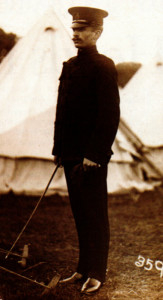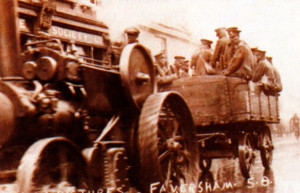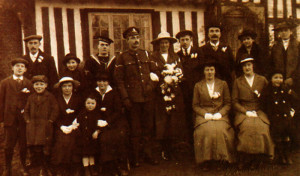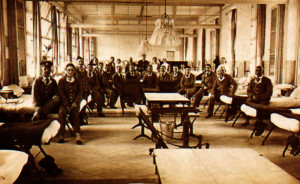
That lone uniformed figure coming through the gate at the far end of Faversham Recreation Ground on a cold misty morning in December 1918 seemed familiar to an eight-year-old boy on his way to school. Of course! My brother Bert, 358142 Bdr. H. D. Clark RGA.
The last time we had heard from him was four months earlier, from the ‘lager’, German Prisoner of War Camp at Dulmen. Fifteen months before that, following one War Office ‘Reported Missing on Western Front’ telegram had come another, ‘Reported in Enemy Hands’. During the long years since Faversham Territorials (Kent Heavy Battery RGA), commanded by Major E. L. Gowland, and the Royal East Kent Mounted Rifles, under The Hon. G. St. Vincent (later Lord) Harris had been mobilised in August 1914, two similar communications had ‘Reported Wounded’.
Now, here he was, back in quiet Faversham after repatriation through Holland and awearyjoumey from Hull. From those perilous years on the Western Front, coming home, unheralded, on that first Monday in December.
I had hesitated on my way to The District School in Orchard Place, whether to take the central asphalt or the shorter ‘muddy path’. Then I saw him come through the far gate of the third path that led to the
railway station. I hesitated no longer.
Skipping along that path, as he walked slowly towards me, I called “Hello Bert!”. “Hello Syd,” he replied – such was the mundane greeting between a younger and older brother in an emotional moment. Then, more emotionally, he enveloped my young hand in his strong fist, and we made our way home together across the familiar ‘Long Bridge’ to No. 3 Preston Avenue.
He opened the back door. Mother was at the kitchen sink, doing the week’s washing in the tub; the log fire crackled beneath the bubbling copper; there was the rubbing board, the Sunlight soap, the ‘blue bag’ to
‘whiten’ the clothes (a colour trick that always confused me!).

Indelible on my memory is the sudden cry of joy, a Mother’s tears, the laughter, repeated throughout the day as members of the family trickled home. Only one thing mattered – Bert was home! They even forgot to send me back to school, and in the circumstances I didn’t bother to remind them. The only day in my life I ever missed school!
Bert was so emaciated that he doubted whether he should go at once to see the girl – Dorrie Fridd, of Saffrey Farm, Selling – to whom he was engaged. But not for long -and soon the wedding was fixed for Boxing Day at the country church.
From our Faversham home, we went to the wedding in a carriage of G. E. Partridge, of The Mall, whose horses doubled up for weddings and funerals, and were also used for outings. I accounted it a privilege to sit high on the outside with the driver, and to walk with him to reduce the load up the steep hills en route.
From the church we went to the great farmhouse for the ‘Wedding Breakfast’, a name which in the late afternoon completely foxed me.
Later on that clear, frosty night we set out to walk the three miles home. At the Sole Street crossroads we paused to say farewell to the newlyweds who were taking the different road to their new home at Boughton Church Farm. As we stood in the moonlight, in the heart of the Kent countryside, so quiet that you could hear the frost crackling in the dry hedge, suddenly the village church clock struck midnight. It was magic!
In after years, when I read Thomas Hardy, I thought of that scene. How he would surely have loved it – peace after war, the tranquil countryside, the soldier still in his uniform, the midnight chime. It was just 80 years ago, but as vivid as though it were today.
Sydney Clark










